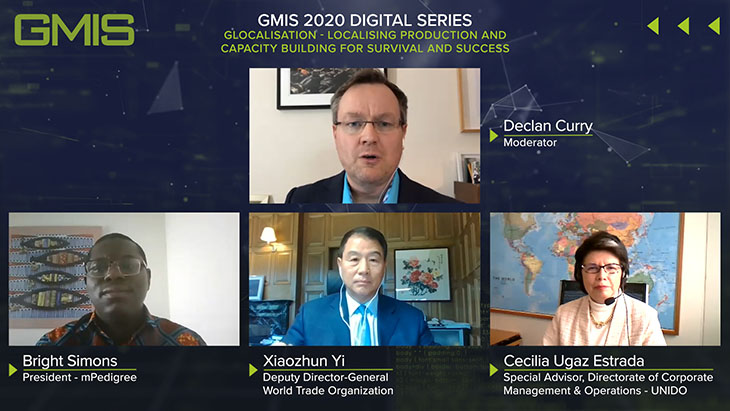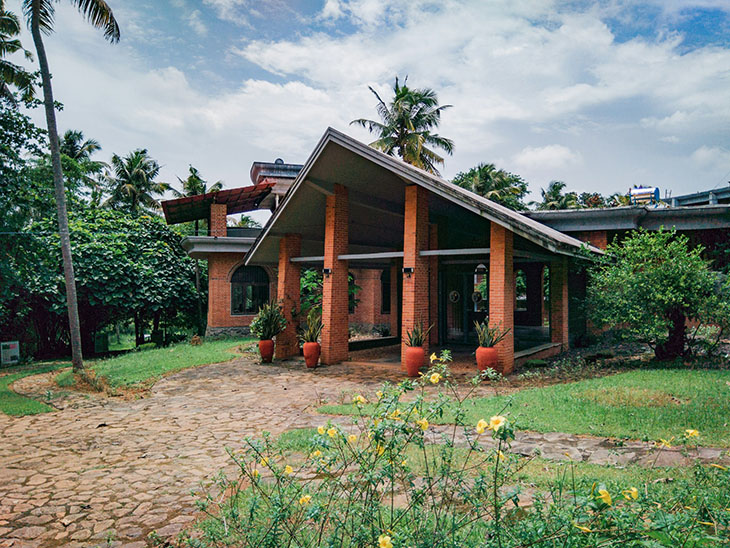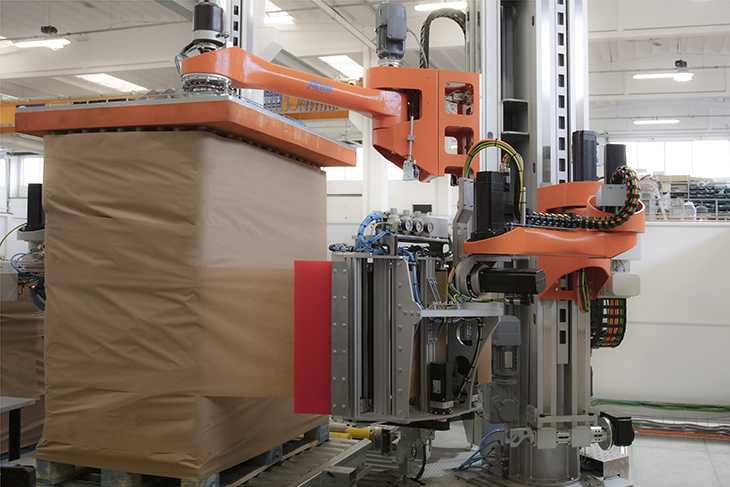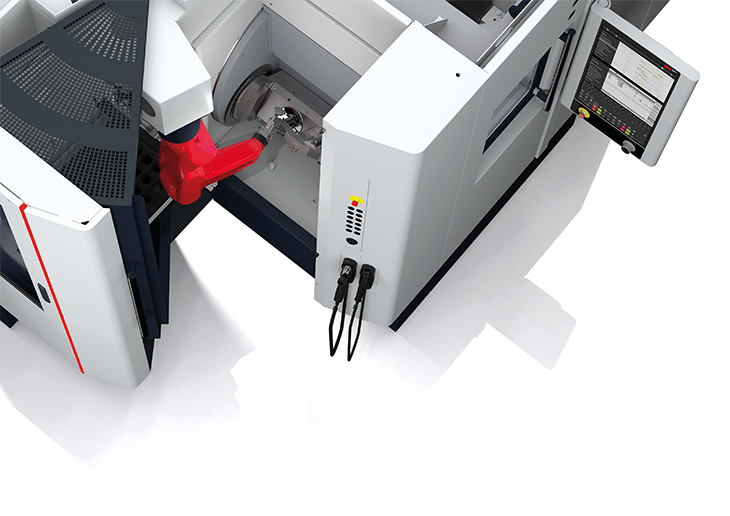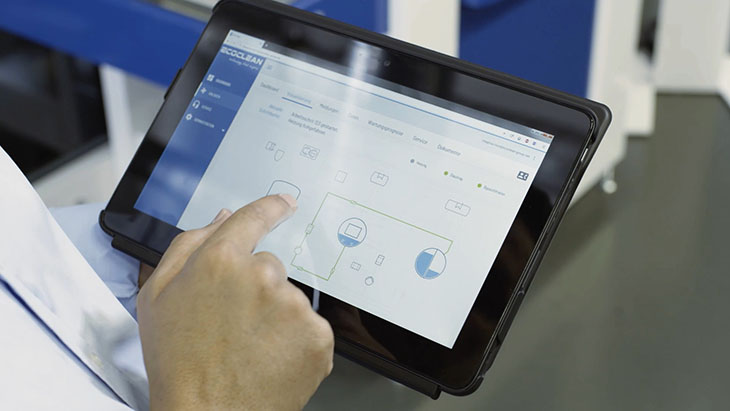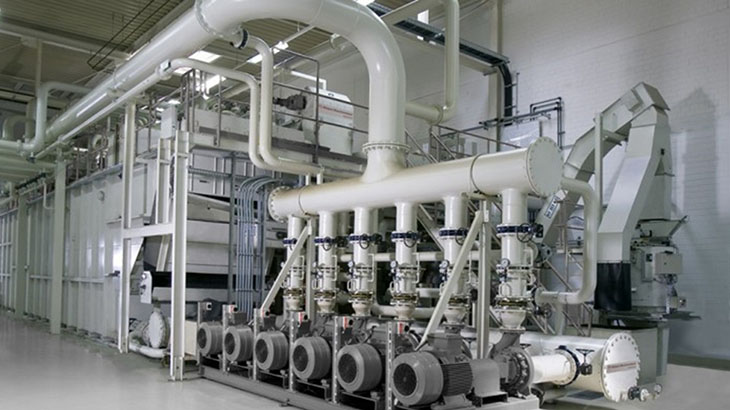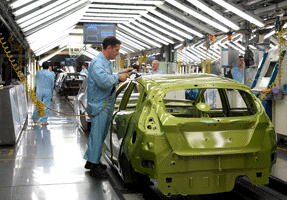- WTO: Future of global value chains depends on China’s industrial strategy and the global adoption of 4IR technologies
- UNIDO: Developing countries must bolster local capabilities with new technologies and skills to become more integrated into global value chains
- mPedigree: African SMEs enter global value chains as virtual technologies lower business costs
- WTO Deputy Director-General Xiaozhun Yi joins UNIDO Special Advisor Cecilia Ugaz Estrada, Founder of mPedigree Bright Simons, and former BBC journalist Declan Curry at Global Manufacturing and Industrialisation Summit’s Virtual Edition (#GMIS2020)
Hannover, Germany – June 30, 2020: The COVID-19 pandemic will accelerate the rise of industrial automation and enable manufacturers in developed countries to compete with low-cost labour in the developing world; multinational corporations are already considering repatriating some manufacturing production as a result of the unprecedented disruption the pandemic has caused to global value chains; developing countries must respond by developing local industrial capabilities with new technologies and skills that will allow them to become more integrated into world trade.
These are some of the key findings from the first virtual panel discussion between representatives of the World Trade Organization (WTO), the United Nations Industrial Development Organization (UNIDO), and Africa-based technology company mPedigree at the Virtual Edition of the Global Manufacturing and Industrialisation Summit (#GMIS2020)
Xiaozhun Yi, Deputy Director-General of the World Trade Organization (WTO), highlighted that more than a third of the predicted decline in world trade brought on by the COVID-19 pandemic was caused by a rise in trade costs and temporary disruptions to transport and logistics.
He stressed that the future structure of global supply chains depends on whether the pandemic accelerates two key trends that have been underway for several years. These include China moving up the value chain due to its industrial strategies or rising labour costs, and the increasing adoption of labour-saving technologies in modern manufacturing. “We believe that this pandemic may accelerate the trend of production automation and we know that this trend may reduce some opportunities in low skilled manufacturing,” Yi said.
However, he added that governments of developing countries can still attract multinational companies by introducing measures to limit trade costs, such as lifting tariffs and minimising travel restrictions and border controls.
Cecilia Ugaz Estrada, Special Advisor, Directorate of Corporate Management and Operations, United Nations Industrial Development Organization (UNIDO), agreed that automation erodes the comparative advantage that low-cost labour gives developing countries over developed countries and this could lead to production being brought closer to the headquarters of transnational corporations that are at the head of global value chains. In response to this shift, developing countries should accelerate efforts towards more regional integration, allowing them to expand markets and trade more with their neighbours, said Ugaz Estrada.
However, Bright Simons, Founder and President of Africa-based technology company mPedigree, said COVID-19 has affected regional trade in Africa as much as global trade and that in some cases regional trade is more impacted. He cited a number of barriers to expanding regional trade within the continent, including high transportation costs, which can make it more expensive to trade within Africa than to trade internationally. “It’s not that easy, even if you wanted to, to maintain a sourcing regime that involves cutting yourself off from global value chains,” he said.
Simons added that the capacity of small and medium enterprises (SMEs) in Africa to export had been constrained for many years by stringent standards requirements and supplier certification programmes in developed countries, particularly in Europe. However, he added that technologies are now emerging that can streamline these processes and reduce the cost for all businesses.
“What virtual capabilities now enable is to reduce the cost of skills importation, so we have had situations where certification bodies are now able to conduct end-to-end audits online,” he said. “That cuts costs by as much as 95% and this for the first time makes it possible for some SMEs to meet these demands and be able to export overseas.”
Hosted by former BBC Journalist Declan Curry, the virtual panel discussion on ‘Glocalisation: localising production and capacity building for survival and success’ is the first of a sequence of weekly sessions of the #GMIS2020 Digital Series that commenced today, and will lead up to the Virtual Summit on September 4-5, 2020. The session is available to watch on-demand at https://bit.ly/2YHVHyY.
Under the theme – Glocalisation: Towards Sustainable and Inclusive Global Value Chains, the third edition of the internationally recognised Global Manufacturing and Industrialisation Summit will virtually, for the very first time, bring together high-profile thought-leaders and business pioneers from around the world to shape the future of manufacturing, discuss the impact of pandemics on global value chains, and highlight the role of fourth industrial revolution (4IR) technologies in restoring economic and social activities. At the top of the #GMIS2020 virtual edition agenda will be the topic of digital restoration – how 4IR technologies are helping to restore the global economy and overcome unprecedented challenges.
Participants can watch the GMIS Virtual Summit and Digital Series by registering on the following link: https://bit.ly/3eYq75o. The programme agenda is available on the following link: https://bit.ly/2Al40r7.
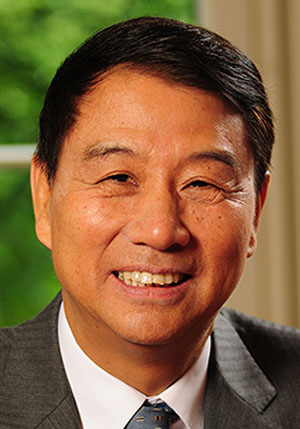
Xiaozhun Yi, Deputy Director-General of the World Trade Organization (WTO)
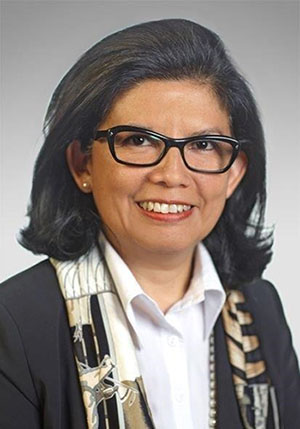
Cecilia Ugaz Estrada, Special Advisor, Directorate of Corporate Management and Operations, United Nations Industrial Development Organization (UNIDO)

Bright Simons, Founder and President of mPedigree









